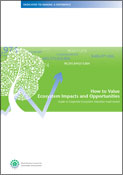How to Value Ecosystem Impacts and Opportunities

The Guide to Corporate Ecosystem Valuation (CEV) is the latest instrument the Council has developed to help companies value the risks and opportunities associated with their impacts and dependence on ecosystem services.
In the past twelve months, fifteen companies have been road testing the new guide. CEV was developed by the WBCSD and its partners to help business build the case for sustainable ecosystem management. The WBCSD has identified 10 reasons why companies should awaken to the opportunities CEV offers. Improved decision-making is one of them, capturing new income streams is another. Although not all of the pilots have been completed, fi ve road testers agreed to lift the veil over their preliminary fi ndings. Most of them belong to the core team that has driven the WBCSD’s ecosystem agenda. The pilots apply to water management (GHD), CO2 reduction (Hitachi Chemical), agriculture (Syngenta), natural habitats (Aggregate Industries / Holcim), and power generation (EDP). The following interviews illustrate how far companies have already come in setting up models that bring ecosystem issues to the heart of their business.
“If you don’t have a market price, people might think there is no value either.” Mikkel Kallesoe, Program Manager Ecosystems Focus Area of the WBCSD, summarizes a key ecosystem challenge companies around the world face when trying to address issues of biodiversity loss and ecosystem degradation.
Download: ![]() 913 kb
913 kb








